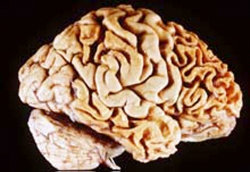Alzheimer's disease accounts for the majority of dementia cases, but a substantial number of persons may be affected by other dementias, including vascular dementia (10 to 20 percent of cases), dementia with Lewy bodies (10 to 15 percent), and frontotemporal dementia (5 to 15 percent). Kawas presents a clinical review of the early diagnosis and treatment of dementia.
The diagnostic criteria for dementia require the patient to have cognitive impairment severe enough to cause social or occupational disability in at least two domains, including memory, language, calculations, orientation, and judgment. The author recommends using a formal testing instrument, such as the Mini-Mental State Examination (MMSE), for detection and follow-up of cognitive decline. Patients with disabling cognitive impairment in at least two domains generally score less than 24 on the MMSE. Patients with only mild cognitive impairment usually score 24 or higher but typically do poorly on the memory component of the examination, which tests for recall of three named objects. The MMSE score should be adjusted for age and education level. A table of cutoff values for normal scores is available at http://www.nemc.org/ psych/mmse.asp.
In addition to the MMSE, the recommended work-up for a patient reporting early signs of cognitive decline includes a thorough history and physical examination. Special attention should be given to screening for medications that may be impairing cognition, such as prescription and over-the-counter sleeping pills, antianxiety medications, and cold and allergy preparations. Non-contrast-enhanced computed tomography or magnetic resonance imaging of the brain is recommended, as is a limited battery of laboratory tests (i.e., electrolyte levels; renal, hepatic, and thyroid function tests; vitamin B12 level). The author notes that B12 deficiency or thyroid dysfunction is rarely the sole cause of dementia but commonly coexist and warrant treatment to improve function. All patients with cognitive decline should be asked about possible depression, which can mimic dementia and be a coexistent complication.
An insidious onset of cognitive problems and steady progression of impairment suggests Alzheimer's disease. However, there is no laboratory or neuropsychiatric test that can definitively diagnose the disease. The presence of certain atypical features (see the accompanying table) suggests the possibility of an alternative diagnosis for the cognitive impairment.
The author concludes with a summary of the limited pharmacotherapeutic options available for the treatment of Alzheimer's disease and the psychosocial support measures that should be explored with the patient and caregivers.
Kawas CH. Early Alzheimer's disease. N Engl J Med September 11, 2003;349:1056-63.
COPYRIGHT 2004 American Academy of Family Physicians
COPYRIGHT 2004 Gale Group



